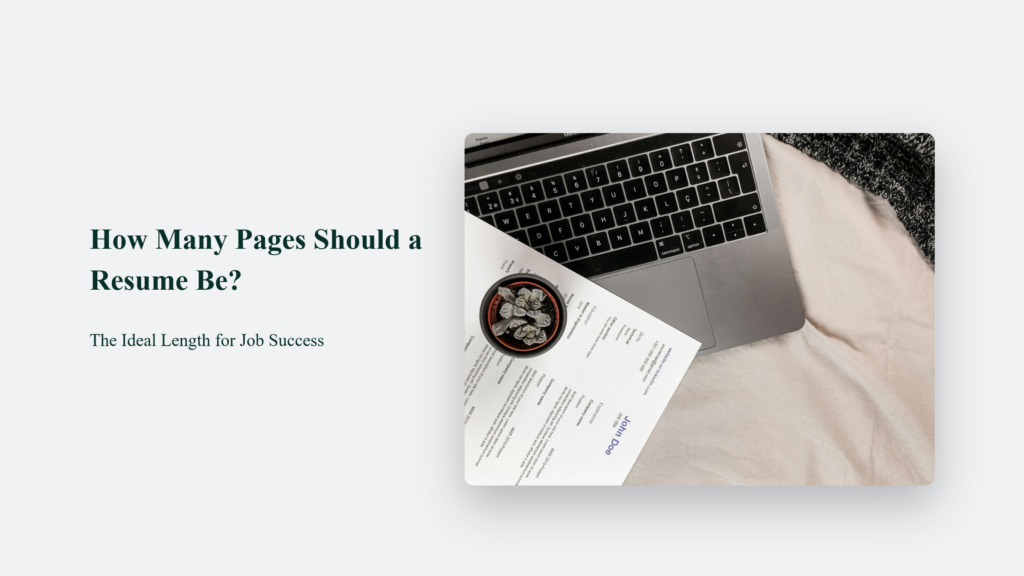As a job seeker, crafting the perfect resume is crucial to catching the attention of potential employers. A common question arises: “How many pages should a resume be?” While there’s no one-size-fits-all answer, understanding the ideal resume length can help you create a compelling document.

How Many Pages Should a Resume Be:
The Sweet Spot: Balancing Concision and Detail
Finding the perfect balance between concision and detail is key when it comes to resume length. A recent survey by Zety revealed that 77% of recruiters prefer a two-page resume for experienced candidates. In comparison, 61% believe a one-page resume is ideal for entry-level job seekers. As a general guideline if you have less than five years of professional experience, a one-page resume should suffice.
It allows you to highlight your most relevant qualifications without overwhelming the reader. However, if you have a decade or more of experience, a two-page resume may be necessary to showcase your career progression and achievements adequately. Interestingly, a study by ResumeGo found that recruiters are 2.9 times more likely to pick a candidate with a two-page resume for managerial roles.
It suggests that providing more detail and context can benefit senior-level positions. Ultimately, the key is ensuring that every information on your resume is relevant and adds value. Prioritise quality over quantity, and don’t be afraid to exceed one page if it means effectively communicating your qualifications and fit for the role.
Tailoring Your Resume to the Job Description
One of the most effective ways to determine the appropriate length for your resume is to tailor it to the job you’re applying for. Take the time to carefully review the job description and identify the key skills, qualifications, and experience the employer seeks. If the job requires a broad range of skills and you have extensive relevant experience, a two-page resume may be necessary to showcase your qualifications adequately.
On the other hand, if the position emphasises a specific set of skills and you can demonstrate your proficiency in those areas within a single page, a one-page resume may suffice.
As a personal example, when I was applying for a marketing position that required a mix of creative and analytical skills, I found that a one-and-a-half-page resume allowed me to highlight my relevant experience and achievements without overwhelming the reader. By tailoring my resume to the job description, I secured an interview and ultimately landed the position.
The Power of Brevity and Relevance
When crafting your resume, focusing on brevity and relevance is essential to capture the attention of hiring managers and recruiters. A study by The Ladders found that recruiters spend an average of just 7.4 seconds initially scanning resumes. To maximise this limited time, prioritise information that directly aligns with the job description and showcases your most relevant skills and experiences.
Start by eliminating outdated or irrelevant information, such as jobs held over 15 years ago or skills no longer pertinent to your current career path. Present your accomplishments and responsibilities concisely using bullet points and quantifying your achievements whenever possible.
Remember, your resume should be a strategic document highlighting your most relevant qualifications rather than an exhaustive list of every job you’ve ever had. Focusing on quality over quantity and tailoring your resume to the specific position increases your chances of capturing employers’ attention and securing an interview.
Industry-Specific Considerations
While the one-page versus two-page resume debate applies to most industries, some exceptions exist. A more extended curriculum vitae (CV) is often expected in academia and scientific research.
However, a one-page resume is still the norm in fields such as technology and engineering, even for experienced professionals. It’s essential to research the resume length norms in your specific industry. Reach out to colleagues, mentors, or industry associations for guidance. They can provide valuable insights into what hiring managers in your field typically expect and help you craft a resume that meets those expectations.
Crafting Your Ideal Resume
In conclusion, the ideal resume length depends on various factors, including your experience level, industry, and specific job requirements. By tailoring your resume to the job description, focusing on brevity and relevance, and following industry norms, you can create a compelling document that showcases your skills and increases your chances of landing your dream job.
Remember, your resume is a reflection of your professional brand. Take the time to craft a resume that highlights your unique value proposition and tells your career story concisely and engagingly. With the right approach and creativity, you can create a resume that stands out from the crowd and opens doors to exciting new opportunities.
Frequently Asked Questions:
Is a three-page resume ever acceptable?
In most cases, a three-page resume is not necessary. However, a three-page resume may be appropriate if you have an extensive work history or are applying for a highly specialized position requiring a detailed list of publications, projects, or patents. Always prioritize relevance and impact over sheer length.
How can I make my resume stand out if I keep it concise?
To make your resume stand out, highlight your achievements, use strong action verbs, and tailor your content to the specific job description. Use clear, concise language and a visually appealing format that is easy to read. Consider incorporating industry-specific keywords and showcasing unique skills or experiences that set you apart from other candidates.
Should I use a different resume length for different job applications?
Yes, tailoring your resume to each job application is a good practice. This may involve adjusting the length of your resume based on the requirements and complexity of the position. A one-page resume may suffice for entry-level roles or positions requiring a broad skill set. A two-page resume may be necessary for more senior or specialized positions to showcase your qualifications adequately.




